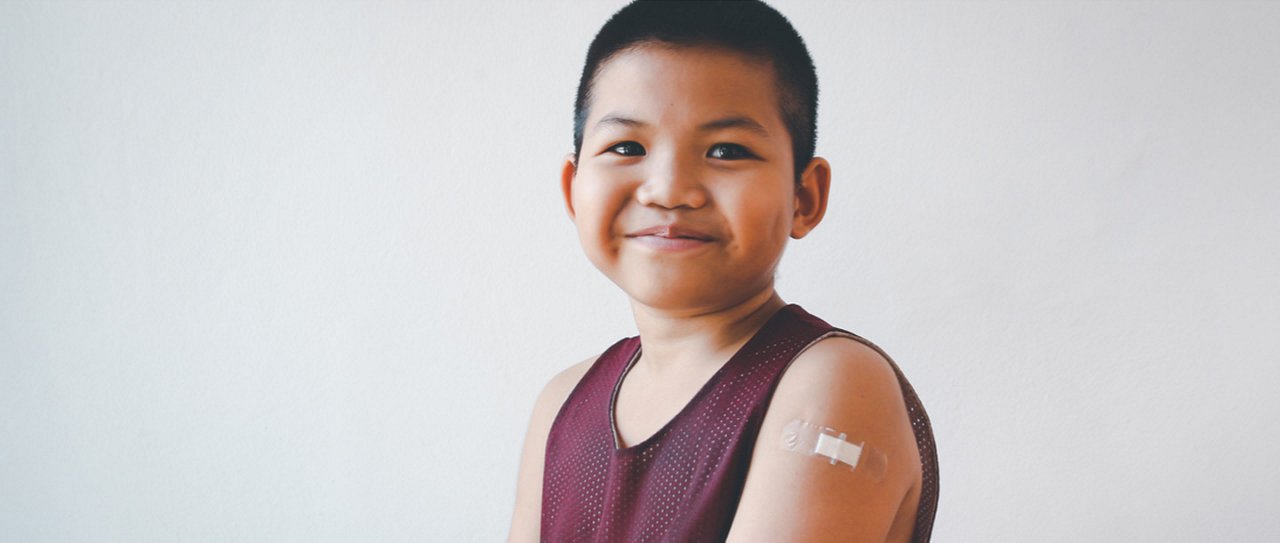5 surefire tips to help your child cope with fear of needles

My kids, ages 6 and 11, got vaccinated for COVID-19 recently. Their school held a vaccine clinic in the back lobby, and it was packed. Most of the kids were taking the jab in stride, but I did see some tears on a few little fellas’ faces (kindergartners, looked like).
My kids, on the other hand, smiled for my iPhone, got their shot without a wince, were band-aided and given a lollipop. Done. I breathed a sigh of relief and felt the world get slightly more normal. I was a bit nervous getting my own shot – a Pfizer booster – but I asked my 6-year-old to hold my hand.
As defiant as my children can be with some things, they’ve never given me any problem with vaccination shots, even as toddlers. But fear of needles, called trypanophobia, can be a huge issue with some children and teens. And with COVID-19 vaccines now available for ages 5 and up, this phobia could be standing in the way of safety and protection, leaving many parents looking for solutions.
My neighbor is one of these parents. She has two lovely girls aged 12 and 13, and her oldest has a needle phobia. It started a few years back when she fainted after getting a flu shot. She got behind on the vaccinations required in 7th grade in North Carolina. She tried – she’d go to the doctor’s office but couldn’t follow through because of the crippling anxiety.
It wasn’t just a dislike of needles, like I have. It was a true terror of them.
Overcoming fear of needles is important now than ever
While some vaccines are highly recommended but optional, like the flu shot, others are necessary to attend school, and the COVID-19 vaccine could be potentially lifesaving. Or heaven forbid, my neighbor said out loud one day on one of our walks, what if an IV was needed at some point, like after a car accident? What would happen then? In other words, needles are sometimes unavoidable.
Right now, fear of needles is keeping many U.S. adults from getting the COVID-19 vaccine. In fact, one in four U.S. adults have a needle fear, with symptoms ranging from some nerves to debilitating panic attacks. 16% of adults even avoid annual flu shots at least partially because they are scared of needles. And a fear of needles is even more common in kids and teens than in adults, with as many as half of teens and a majority of younger children suffering from needle phobia.
This spring, knowing that her daughter couldn’t avoid needles any longer, my neighbor took action. She found a therapist that specializes in exposure therapy to overcome phobias and made a virtual appointment. She also found a new pediatrician who was open to doing things a little differently.
Over the course of several virtual therapy sessions, my neighbor’s daughter became less and less afraid of needles. She came up with a personalized plan to get her shots. Her plan included being vaccinated outdoors – something her new pediatrician was open to.
It wasn’t an easy fix. It was a process that took several weeks and was an investment in time and therapist fees. But it was possible. She caught up on the necessary vaccines for school, and then a few weeks after that received her first COVID-19 vaccine.
After she was fully vaccinated for COVID-19, her mom greenlighted her to go on sleepovers, play team sports, go shopping at the mall, and do all the things that this young teenager loved before the pandemic.
Techniques for handling needle phobia
If your child struggles with a needle phobia, here are some tips that might help from Cedars Sinai:
- Make sure your child looks away. No need to watch the injection.
- Numb the area. Many pediatricians will use topical anesthetics to help with pain.
- Use relaxation techniques. Try deep breathing or visualizing a peaceful scene.
- Try distraction. Maybe it’s a game on your phone, a TikTok video, or something similar.
- Focus on the pay-off. Getting the COVID-19 vaccine has lots of benefits for our kids, and focusing on those benefits can help kids manage the temporary discomfort of the shot.
Are you or another adult you know struggling with a fear of needles? Here are some ways to cope:
- Talk to your doctor about your concerns beforehand.
- Go to your appointment with someone you trust.
- Listen to music or play on your phone for a distraction.
- Ask your doctor about topical anesthetics to numb the area.
- Look away during the shot.
- Try tensing your muscles to keep your blood pressure up.
Therapy for fear of needles
If you think exposure therapy might be right for your child, here are our tips for finding an in-network therapist.
Therapists who commonly work with anxiety may be able to help.
If you have questions about mental health benefits provided through Blue Cross and Blue Shield of North Carolina, call the number on the back of your card, and a customer service representative will be able to help.
Browse related articles


Blue Cross and Blue Shield of North Carolina does not discriminate on the basis of race, color, national origin, sex, age or disability in its health programs and activities. Learn more about our non-discrimination policy and no-cost services available to you.
Information in other languages: Español 中文 Tiếng Việt 한국어 Français العَرَبِيَّة Hmoob ру́сский Tagalog ગુજરાતી ភាសាខ្មែរ Deutsch हिन्दी ລາວ 日本語
© 2025 Blue Cross and Blue Shield of North Carolina. ®, SM Marks of the Blue Cross and Blue Shield Association, an association of independent Blue Cross and Blue Shield plans. All other marks and names are property of their respective owners. Blue Cross and Blue Shield of North Carolina is an independent licensee of the Blue Cross and Blue Shield Association.


